Special Feature 2022 - Integrated Report 2022
Corporate Governance - Create a solid governance system
Build a Fair, Transparent and Highly Effective Governance System
Build a fair, transparent and highly effective governance system
Basic stance
The purpose of the corporate governance of the Nidec Group is to become a conscientious and principled company that earns society’s trust, and to increase our corporate value sustainably based on the motto, “High growth, high profit, and high share price.” To this end, we maintain and enhance our internal control, thereby running our business more healthily and efficiently. Furthermore, we disclose information appropriately to increase the transparency of the company’s business operations.
For example, Nidec became a company with an Audit and Supervisory Committee in 2020, and has been working to enhance the supervisory function of the Board of Directors by setting up a Remuneration Committee. For the effectiveness evaluation of the Board of Directors in FY2021, we have introduced an evaluation by a third-party organization for the purpose of objective evaluation and analysis. To further improve the effectiveness of the Board of Directors, we will continue the third-party evaluation system.
Nidec is also committed to ensuring the independence and diversity of the Board of Directors. The Board of Directors of Nidec comprises ten members, including six outside members. All ten members are individually selected with a good balance, based on their knowledge, experience and qualifications in a diversity of areas, as well as on Nidec’s businesses, business environment and the like. The members include those with broad experience of working overseas, as well as women, in order to secure diversity. Going forward, when selecting candidates for the Board of Directors, Nidec will continue to take into account, among others, the balance of the knowledge, experience and qualifications of the Board of Directors as a whole, and the number of its members based on its diversity in gender, career history, age, etc. and on Nidec’s business scale.
Based on the understanding that corporate governance is one of the highest-priority issues for our sustainable growth and medium- to long-term improvement in corporate value, we will make persistent efforts to enhance and improve the relevant systems.
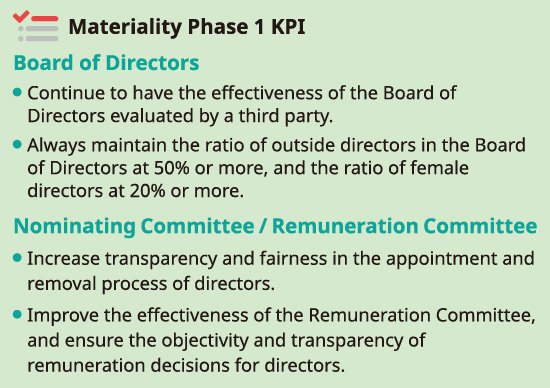
Initiatives in FY2021
To ensure the effectiveness of the Board of Directors, Nidec annually sends out questionnaires to all members of the Board of Directors, including Outside Members. Based on the results, the Board of Directors holds discussions to analyze and evaluate its effectiveness and current issues. In FY2021, we introduced a third-party (external law firm) evaluation system for objective evaluation and analysis. The third party has evaluated the effectiveness of the Board of Directors as follows: In consideration of the composition, frequency and length of the Board of Directors’ meetings and the quality of information, the Board of Directors’ meetings functioned sufficiently on the whole, and the discussions at and operation of the Board of Directors’ meetings have been improved. The effectiveness has also been evaluated appropriate in that the Board of Directors has an atmosphere in which Outside Members can speak freely. Based on the results of the questionnaires, we will continue to formulate measures for constant improvement.
With regard to executive remuneration, Nidec has redesigned its executive remuneration system to improve the objectivity and transparency of procedures. With regard to executive remuneration for FY2022, the Remuneration Committee submitted a report to the Board of Directors after deliberations in order to ensure the appropriateness of remuneration levels, business result evaluations, and performance evaluations of executives.
Toward the future
To ensure the effectiveness of the Board of Directors, we will implement ongoing measures, such as providing sufficient information and securing opportunities for discussion on each item of the agenda, promoting understanding of our business by non-executive directors (providing explanation of business by executive directors, conducting online plant tours), and examining information provided by stakeholders.
Important matters, such as the selection of candidates for directors, are discussed and resolved at a meeting of the Board of Directors attended by independent outside directors. So far, independent outside directors have properly participated in the meetings to give advice. We will continue to take necessary measures taking into consideration the social situation and requests from our stakeholders. We will also continue efforts to improve the effectiveness of the Remuneration Committee.
History of Nidec’s corporate governance
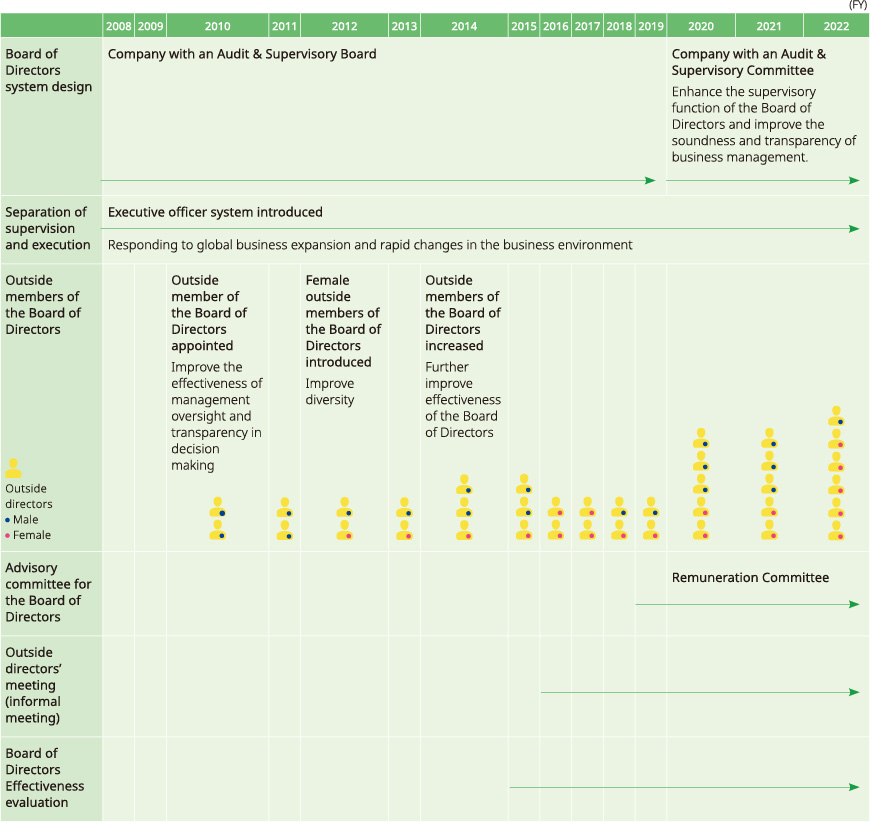
Corporate governance structure
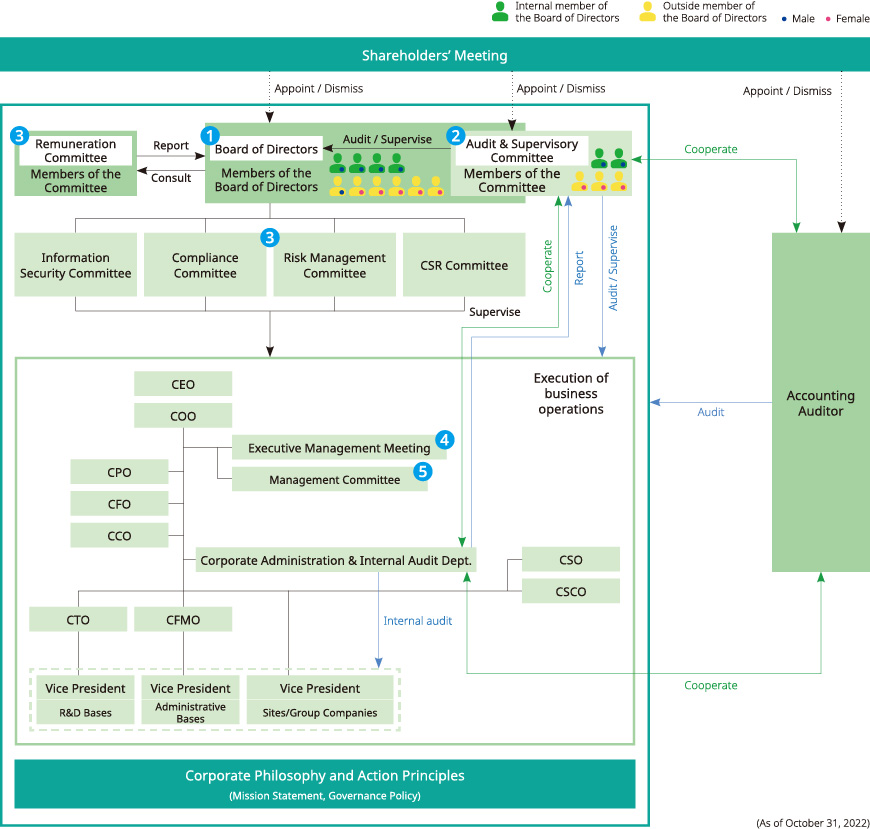

➊ Board of Directors
Status of operation
The Board of Directors makes material management decisions and oversees the Group’s business operations as a whole. The Board of Directors includes highly independent Outside Members, to enhance the supervisory function of the company’s business operation and improve management transparency and objectivity.
Themes of deliberations at the Board of Directors meetings

Questionnaire survey on the effectiveness of the Board of Directors (efforts and evaluation)
Efforts made in FY2021
- Continued to provide explanation for Outside Members of the Board of Directors prior to Board meetings so that they can be provided with sufficient information on each item of the agenda and opportunities for discussion.
- Promoted understanding of our business by non-executive directors at informal meetings (explanation of business and online plant tours) and examined information provided by various stakeholders.
- Explained the career background, skills, etc. of the persons appointed as executive directors or other responsible executive positions upon appointment.
- Provided active feedback to departments where issues related to risk management had been pointed out.
Summary of FY2021 evaluation results
- Evaluated as appropriate in that the Board of Directors’ meetings on the whole functioned sufficiently, that discussions and operation of the Board of Directors’ meetings have been improved, and that the meetings had an atmosphere in which outside members felt free to voice their opinions, in addition to the composition, frequency and length of the Board of Directors’ meetings and the quality of information and explanation provided at them.
- Highly appreciated also by the third-party evaluation in that discussions and the operation/supervision function of the Board of Directors on the whole have been improved, confirming that our Board of Directors’ meetings are functioning properly.
- Problems found included insufficiency of efforts to realize the medium- to long-term plan and analysis of the cause of failure to achieve targets, insufficient time and resources secured for discussions of issues related to management strategies and the systematic development of successors to management positions, and insufficient volume of the reference materials (explanatory materials) provided.

Skills matrix
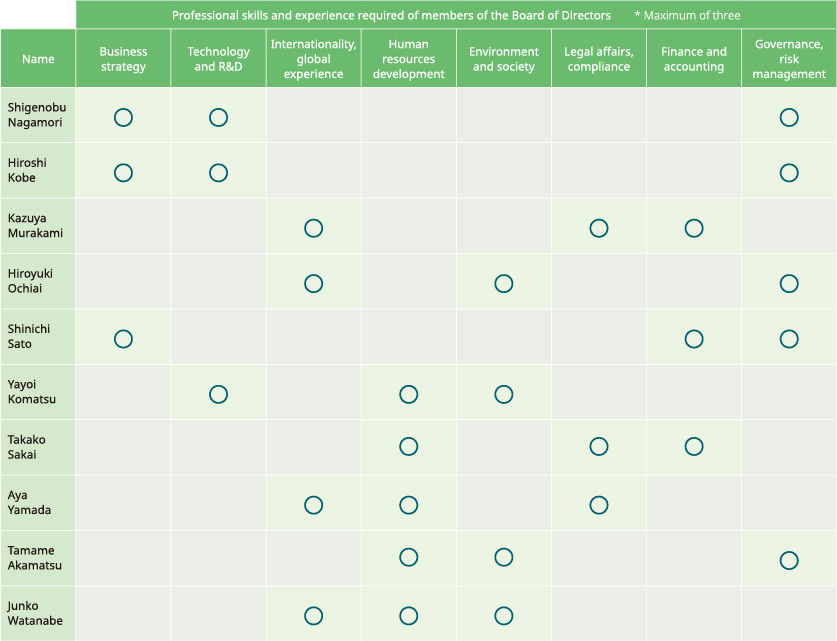
➋ Audit and Supervisory Committee
The Audit and Supervisory Committee audits the execution of duties by the Board of Directors’ members, and receives audit reports from the Accounting Auditor.
Composition of members and the chairperson

Cooperation between the Audit and Supervisory Committee and accounting auditors
In addition to quarterly meetings, the Audit and Supervisory Committee and the accounting auditors meet about two or three times a year whenever necessary. In these meetings, they exchange information and opinions on audit results, audit systems, audit plans, audit implementation status and the like.
Cooperation between the Audit and Supervisory Committee and the internal audit department
The Corporate Administration & Internal Audit Department, Nidec’s internal audit department, regularly hold meetings with the Audit and Supervisory Committee to report on the results of the Nidec Group’s internal audits. In addition, the Audit and Supervisory Committee exchanges opinions and shares information with the Corporate Administration & Internal Audit Department as necessary, and requests the Corporate Administration & Internal Audit Department to conduct on-site audits.
➌ Various committees
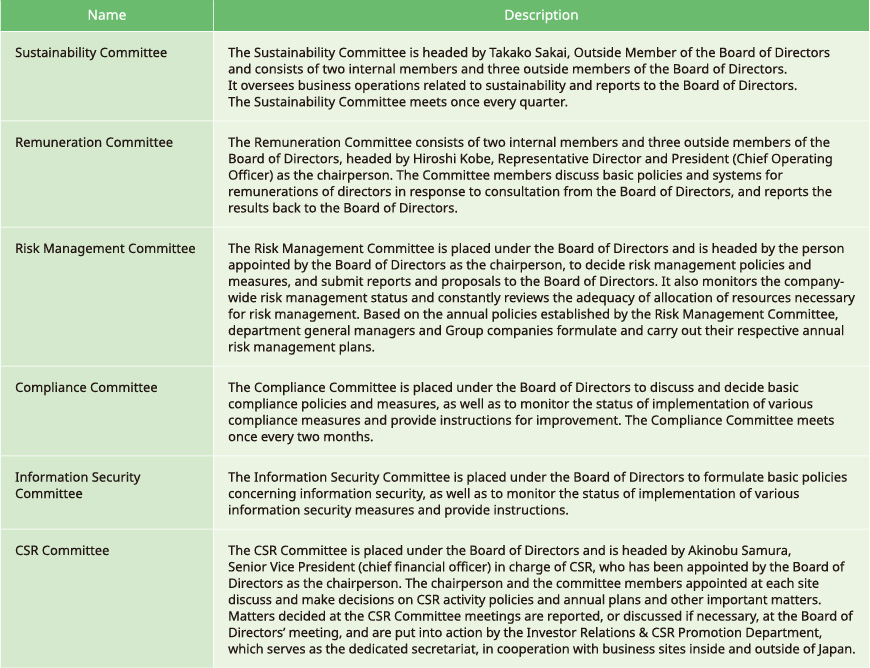
➍ Executive Management Meeting
The Executive Management Meeting convenes once a month to assess the present state of business and determine the next course of action, based on the monthly performance data and outcome of discussions at respective meetings where important group-wide concerns are shared among administrative departments, subsidiaries and business units.
➎ Management Committee
The Management Committee, the consultative body to the Representative Director and Chairman, is held and chaired by the President and Chief Executive Officer twice a month in principle to discuss overall operational directions, plans and other important considerations in the execution of business.
Reasons for appointment and major activities of Outside Members of the Board of Directors
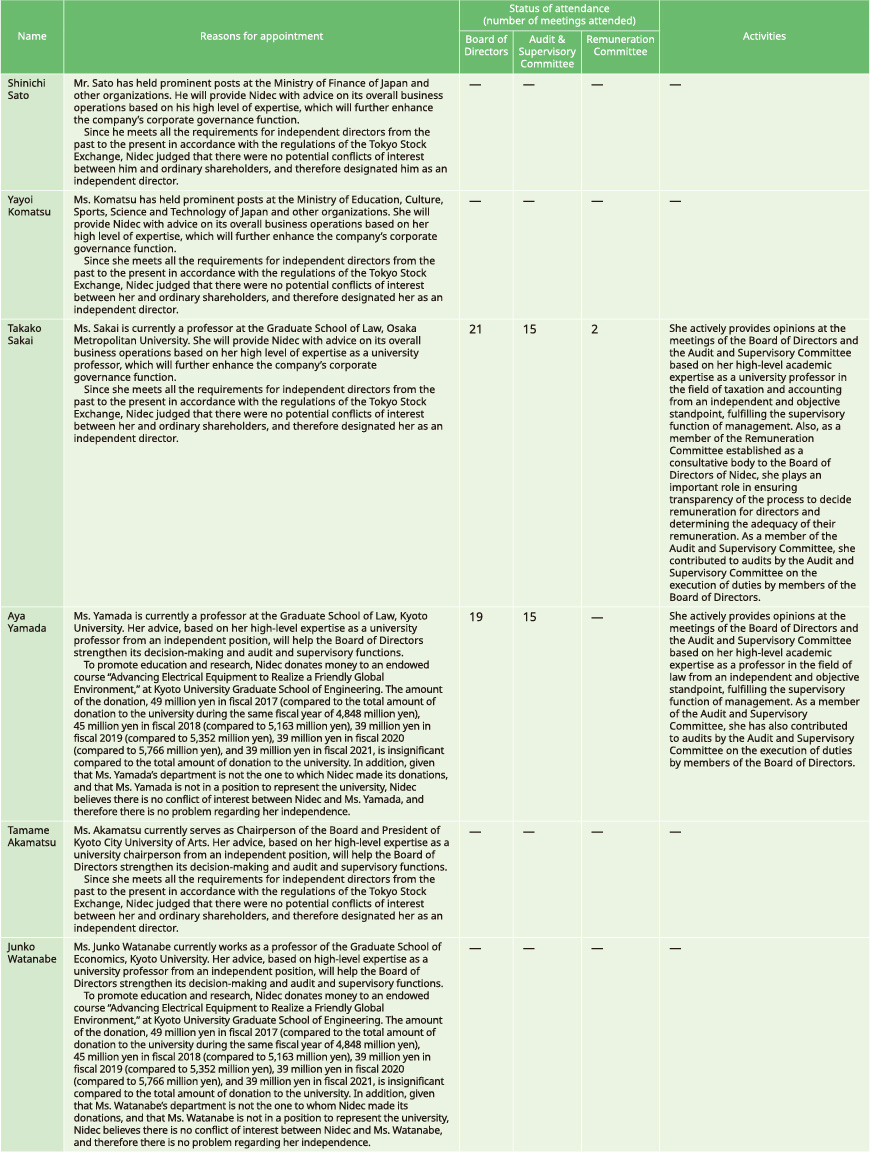
* During the fiscal year under review, the Board of Directors held 22 meetings, the Audit and Supervisory Committee held 15 meetings, and the Remuneration Committee met twice.
Support systems for Outside Members of the Board of Directors
The General Affairs Department, which acts as the secretariat for the Board of Directors, supports the Outside Members of the Board of Directors. The General Affairs Department provides the outside directors with the company’s information in a timely manner, and corresponds to their inquiries through day-to-day communication. With regard to the meetings of the Board of Directors, the General Affairs Department provides all members of the Board of Directors with materials related to the proposals for the meetings and accounting information, at the latest one day before the day of the meeting. In addition, assistance is provided by the Corporate Administration & Internal Audit Department, Nidec’s internal audit department, to Outside Members of the Board of Directors who are Audit and Supervisory Committee Members. When a meeting of the Audit and Supervisory Committee is held, meeting notices are sent out to all the Audit and Supervisory Committee Members by three days prior to the day of the meeting, while documents related to the proposals to be deliberated in the meeting of the Audit and Supervisory Committee are sent to the members, at the latest one day before the meeting. After a meeting of the Audit and Supervisory Committee, meeting minutes are sent to all Audit and Supervisory Committee Members. Furthermore, for Outside Members of the Board of Directors who are Audit and Supervisory Committee Members, various information is reported and provided as necessary by full-time Audit and Supervisory Committee Members and Nidec’s executive officers.
Outside Members of the Board of Directors who are not members of the Audit and Supervisory Committee have informal meetings with the Audit and Supervisory Committee members, where various information is provided by Nidec’s executive officers. They also inspect the field sites of subsidiaries using the Web.
Executive remuneration
1. Policies on remuneration for Members of the Board of Directors
➊ Basic policy
The remuneration for Nidec’s directors is determined based on the following policy, to enhance the company’s global competitiveness and secure the sustainable growth of its businesses.
- Increase motivation toward improving corporate value;
- Contribute to securing talented managerial human resources; and
- Ensure that the level of the remuneration is appropriate for the scale and area of Nidec’s businesses.
➋ Composition of the remuneration
- Outside Members of the Board of Directors (excluding those who are members of the Audit and Supervisory Committee)
Fixed remuneration - Members of the Board of Directors (excluding those who are Outside Members of the Board of Directors and members of the Audit and Supervisory Committee)
Fixed remuneration:Variable remuneration (bonuses) :Performance-linked share-based remuneration
= 3 : 1.5 : 1

➌ Procedure to decide the remuneration amounts
The amounts of fixed and variable remunerations for individual directors (excluding members of the Board of Directors who are members of the Audit and Supervisory Committee) are determined by the Board of Directors based on reports submitted by the Remuneration Committee, which is a voluntary advisory body, in accordance with the criteria specified by this policy. Similarly, the details of the performance-linked share-based remuneration are determined by the Board of Directors based on reports submitted by the Remuneration Committee.
➍ Forfeiture, etc. of remuneration (clawback/malus)
The amounts of fixed and variable remunerations may be reduced if the recipient has caused serious damage to the company by obtaining the consent of the recipient.
Based on the performance-linked share-based compensation plan, if any individual to be issued shares should, on or after the day when his/her right to receive compensation is finalized, commit an illegal action such as a material violation of his/her duties or internal rules/regulations, the company may request that the individual pay restitution.
2. Total amount of remuneration by category of directors and by type of remuneration, and the number of eligible directors

*1 The above performance-linked remuneration includes the amount paid to five members of the Board of Directors who resigned during the 48th period.
*2 The introduction of the performance-linked share-based remuneration system was resolved at the 45th Annual General Meeting of Shareholders held on June 20, 2018. The amounts of expenses recorded for the fiscal year under review according to the Japanese standard are provided above. Outside members of the Board of Directors are not covered by the system.
3. Total amount of consolidated remuneration, etc. of each director

* Only directors whose total amount of remuneration is 100 million yen or more are presented.
Internal control
The Nidec Group commits itself to enhancing its management soundness and transparency by establishing a compliance system generally required of a listed company in Japan, and clarifying its risk management responsibilities. Specifically, through the auditing activities of the Corporate Administration & Internal Audit Department, the Group aims to maintain and improve the effectiveness of its internal control over financial reporting required by Article 24-4-4, Paragraph 1 of the Financial Instruments and Exchange Act. In addition, the Legal & Compliance Department, the Risk Management Committee, the Information Security Committee and the CSR Committee are organized under the Board of Directors, under which the Legal & Compliance Office, the Risk Management Office, the Information Security Management Office, and the IR & CSR Promotion Department are placed as the secretariat respectively, working to create a corporate culture and enhance management systems for internal control.

Corporate governance of Group companies
The Nidec Group companies operate under Nidec’s mission statement and policies, and therefore they are incorporated in Nidec’s internal control system. The Group companies, to which Nidec sends some directors and employees, have sufficient discussions before making decisions on business execution that correspond to the circumstances of each company, based on specialists’ opinions as necessary, thereby endeavoring to assure their independence.
Cross-shareholding
Policy for cross-shareholding
Nidec holds shares in the companies that Nidec has relationships with in terms of trading and cooperation in its business and other areas, when it judges that such shareholding contributes to the company’s corporate value expansion through stabilization of its business from a medium- to long-term perspective by maintaining and strengthening its relationship with those companies. Nidec assesses its cross-held shares individually at the Board of Directors meeting every year, on not only qualitative aspects such as the purpose of the shareholding, but also on quantitative aspects such as the benefits that can accrue through the shareholding from the perspective of economic rationality. According to the results of the assessment, Nidec intends to reduce the number of shares it holds if the cross-held shares are not expected to bring significant benefits.
Criteria for exercising voting rights for cross-shareholding
With regard to the exercise of voting rights in relation to cross-shareholdings, Nidec makes comprehensive decisions to vote for or against individual proposals to serve the investees’ sustainable growth from the perspective of whether appropriate governance and compliance structures are in place at investee companies.
(Basic views on exercising voting rights)
With regard to the individual proposals submitted to the shareholders’ meetings of the companies Nidec invests in, Nidec decides to vote for or against after confirming the following points: whether the proposals suit the purposes of the shareholding which are to maintain and strengthen the trade and cooperation relationships through medium- to long-term investment; and particularly, whether there are any circumstances that might lead to undermining of the shareholders’ value due to the restructuring of organizations, including asset transfer and mergers. Nidec opposes all proposals that are considered to violate the law or constitute antisocial behavior, in all circumstances.

